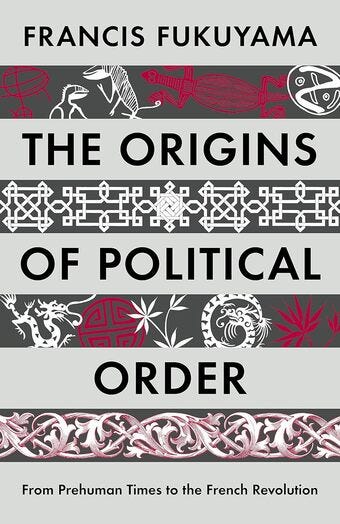My Rating: ★★☆☆☆ (DNF)
Intro & Summary
Francis Fukuyama’s The Origins of Political Order is actually the first of a set of two books. This book covers political evolution from prehistory up to the late 18th century CE. It seeks to identify the origins and evolution of the political systems that eventually became those we know in the modern day.
I’ll be upfront and note that I did not finish (DNF) this book. But I got just over a third of the way through and think that’s enough to write a bit of a review.
My husband liked this book so much, and he’d been trying to get me to read it for months before I agreed to add it to my list for this year. I really want to finish it, because there’s a lot of interesting ideas and points made, but I really can’t handle the dry, academic writing style.
Fukuyama, Francis. The Origins of Political Order : From Prehuman Times to the French Revolution. London: Profile, 2012.
Readability
I struggled with this one. I kept describing it to my husband as “war flashbacks” to some of the incredibly dry textbooks I had to read for my undergraduate history and anthropology classes.
Fukuyama writes very long, complex sentences with lots of “big words” that I imagine most people would have to look up. He walks a fine line between coming across as a very intelligent writer and a pretentious one. I tended to find him landing squarely on the former side; his writing is quite scholarly, but I never felt like he was talking down to me or making himself seem bigger and more intelligent or authoritative than he actually is. It’s just how he writes.
That said, it was a real slog to get through even the bit of this book I managed. I stopped at page 241 (the end of Part 2 of 5) with a reading time of 8 hours and 13 minutes. I rarely stopped to take notes, because I needed to focus so hard on the writing. Compare this to Great Commanders of the Medieval World, which is nearly twice that length and for which I stopped often to make notes. I read that whole book in just over 7 hours. So you might see how reading Fukuyama might have felt like pulling teeth.
I looked into the audiobook at one point, thinking maybe having someone read it to me might help my comprehension, but every time I try this I always end up reading ahead of the speaking pace of the narrator. So that was out. I did, however, have a peek at the reviews for the audiobook and found that a good number of people had the same idea. And I think one review succinctly captured my main issue with the text:
"The book's main defect [is] burying the insights under excessive elaboration."
Judging by the way he writes, Fukuyama seems like one of those people who really likes to talk. And I mean that in a wholly objective sense, not as an insult. But as someone who also likes to talk, I quickly recognised his habit of repeating himself.
It’s fine to repeat matter, especially to review at the end of a chapter. It can even be helpful, especially if the writing style is as dry and dense as that in Origins of Political Order. However, Fukuyama sometimes takes this too far.
The most egregious instance comes at the end of Chapter 2, in which, about two thirds of the way through, he briefly lays out the building blocks of society previously discussed, summarises them into a helpful list… and then proceeds to spend another third of the chapter summarising it all again in long form.
I nearly put the book down right there.
Learning
With all my complaints about the readability above, it should come as little surprise that I don’t really feel like I learned much. My notes are sparse and have gaps spanning multiple chapters because I just couldn’t put the book down to make any notes without losing my place. And most of the time I was concentrating so hard on understanding the words on the page that I didn’t have the capacity to write any of my own, even to summarise or annotate.
Most of the section I managed to get through was about ancient China, and it just made me want to go play Emperor: Rise of the Middle Kingdom, a city-builder game that covers much of the same time period. Needless to say I had much more fun with Emperor than Origins.
While I can’t say I really learned anything from the text itself, I can’t say I didn’t learn anything at all. I found that I still like anthropology as well as history, and I still don’t like traditional academic writing.
Would I Read It Again?
No.
As I said before, getting myself settled down to read this book felt like pulling teeth. I spent days at a time avoiding it, even though I knew I wouldn’t finish it in a month if I didn’t read 2 chapters per day and could only really manage 1 per reading session.
I thought to try to finish it throughout the rest of this year, because when I can get through his writing style Fukuyama has a lot of interesting ideas and points to make. But having set it down for nearly a month I really can’t bring myself to get back to it.



